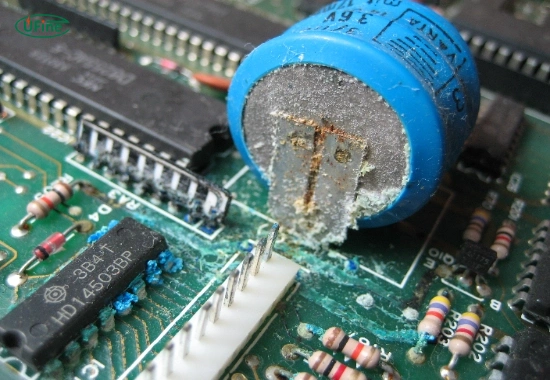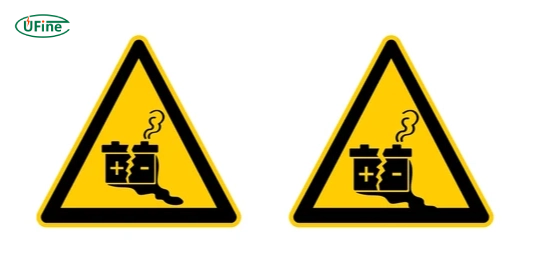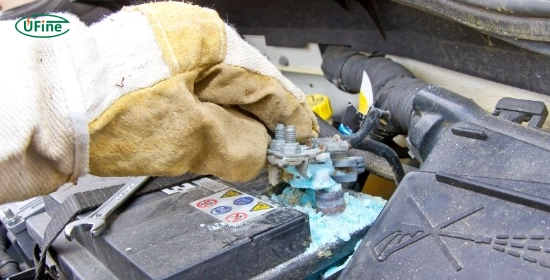
- Part 1. What causes batteries to leak?
- Part 2. Are leaking batteries dangerous?
- Part 3. How to identify a leaking battery?
- Part 4. What to do if you find a leaking battery?
- Part 5. How to prevent battery leaks?
- Part 6. Are certain types of batteries more prone to leaking?
- Part 7. Can leaking batteries cause fires?
- Part 8. What are the environmental impacts of leaking batteries?
- Part 9. Are leaking batteries harmful to pets?
- Part 10. FAQs
Battery leakage is a problem most people encounter at some point, but many overlook the potential dangers it poses. Whether it’s from a household device or a car battery, understanding the risks and how to handle leaking batteries is essential for your safety. In this article, we’ll explore what makes leaking batteries dangerous, how to identify leaks, and what you can do to handle them safely. Read on to learn everything you need to know about this common yet risky issue.
Part 1. What causes batteries to leak?
Batteries leak for several reasons, most related to chemical reactions inside the battery. Over time, the internal components break down, releasing corrosive chemicals. This can happen due to:
- Overcharging or overheating: Excess heat causes pressure build-up and can force chemicals out of the battery casing.
- Physical damage: Cracks or punctures in the battery case allow the contents to escape.
- Expired batteries: As batteries age, the seal protecting the chemicals weakens, increasing the risk of leakage.
- Improper storage: Storing batteries in hot or humid environments accelerates their degradation.
The chemicals released during leakage are usually corrosive and toxic, making it crucial to handle leaks carefully.
Part 2. Are leaking batteries dangerous?
Yes, leaking batteries are hazardous. The dangers stem from the corrosive and toxic nature of the chemicals involved. Alkaline batteries, for example, release potassium hydroxide, which can cause skin irritation and damage surfaces. On the other hand, lithium-ion batteries can release flammable and toxic gases that pose a fire hazard.
Key dangers of leaking batteries:
- Health risks: If inhaled, coming into contact with the chemicals can cause burns, skin irritation, and respiratory problems.
- Fire hazards: Some battery leaks, particularly from lithium-ion batteries, can ignite under certain conditions.
- Damage to electronics: The corrosive chemicals can ruin the devices the batteries are powering.
- Environmental harm: Improperly disposing of leaking batteries can pollute soil and water.
It’s essential to address a leaking battery immediately to minimize these risks.
Part 3. How to identify a leaking battery?
Identifying a leaking battery is relatively straightforward if you know what to look for. Common signs include:
- White or crusty residue: A flaky white or greenish substance around the terminals or casing indicates leakage.
- Swollen or deformed casing: Batteries that appear bloated or misshapen are likely leaking internally.
- Unusual smells: A strong chemical or metallic odor often accompanies a leaking battery.
- Corroded or damaged terminals: Corrosion on the battery’s surface or in the device it powers can indicate a leak.
If you suspect a battery is leaking, handling it carefully is crucial to avoid exposure to harmful chemicals.
What does Battery Acid Smell Like? How Should I Dispose of it?
Part 4. What to do if you find a leaking battery?
If you discover a leaking battery, follow these steps to deal with it safely:
- Wear protective gear: Wear gloves and safety glasses to protect your skin and eyes from corrosive chemicals.
- Remove the battery carefully: Avoid touching the leaked material directly. Use a non-conductive tool, like a plastic spatula, to remove the battery.
- Clean the area: Neutralize alkaline battery leaks with baking soda and water. For lithium-ion batteries, contact a professional or follow manufacturer guidelines.
- Dispose of the battery properly: Place the leaking battery in a plastic bag or container and take it to a recycling center that accepts hazardous waste.
- Check for damage: Inspect the device or surface where the battery was for corrosion or damage. Clean the area thoroughly before using it again.
Handling leaking batteries responsibly is essential to preventing harm to yourself and the environment.
Part 5. How to prevent battery leaks?
Preventing battery leaks is more straightforward than dealing with the aftermath. Follow these simple tips to keep your batteries in good condition:
- Store batteries properly: Keep them in a cool, dry place away from direct sunlight and heat.
- Use compatible chargers: Overcharging can lead to overheating and leaks, especially with rechargeable batteries.
- Replace old batteries promptly: Don’t leave expired batteries in devices, as they are more likely to leak.
- Check for damage: Avoid using batteries with cracked or dented casings.
- Remove batteries from unused devices: If you’re not using a device for an extended period, take the batteries out to prevent leaks.
By taking these precautions, you can extend the life of your batteries and minimize the risk of leaks.
Part 6. Are certain types of batteries more prone to leaking?
Yes, certain battery types are more likely to leak than others. Alkaline batteries are among the most common household batteries notorious for leaking when overused or expired. Rechargeable batteries, like nickel-metal hydride (NiMH) or lithium-ion, are less likely to leak but can still pose risks, significantly if damaged or overcharged.
Batteries prone to leaking:
- Alkaline batteries are most susceptible to leakage, especially if left in devices for too long.
- Lithium-ion batteries are less likely to leak but can release flammable gases if punctured or overheated.
- Zinc-carbon batteries: Older and cheaper, these are more prone to leaks than modern alkaline or rechargeable options.
Understanding the risks of different battery types can help you make safer choices.
Part 7. Can leaking batteries cause fires?
Yes, leaking batteries, particularly lithium-ion ones, can cause fires. When these batteries leak, they may release flammable gases that ignite when exposed to heat or sparks. This is why handling lithium-ion battery leaks with extreme caution is critical.
How to reduce fire risks:
- Avoid overcharging batteries, especially lithium-ion ones.
- Store batteries in a cool, dry place to prevent overheating.
- Dispose of damaged or leaking batteries promptly.
Fires caused by leaking batteries can be dangerous and difficult to extinguish, so proactive prevention is key.
Part 8. What are the environmental impacts of leaking batteries?
Leaking batteries harm the environment because the chemicals they release can contaminate soil and water. Improperly disposed batteries can leach toxic substances like lead, cadmium, and mercury, which take years to break down and harm ecosystems.
How to reduce environmental harm:
- Recycle batteries at designated collection points.
- Avoid throwing batteries in regular trash bins.
- Educate yourself about local regulations for hazardous waste disposal.
Taking these steps can help protect the environment from the long-term effects of battery leakage.
Part 9. Are leaking batteries harmful to pets?
Yes, leaking batteries are hazardous for pets. If pets chew on a leaking battery, they can suffer from chemical burns in their mouth or gastrointestinal tract. The toxic chemicals can also cause vomiting, drooling, and difficulty breathing.
- What to do if your pet is exposed:
- Rinse their mouth with water immediately, but avoid forcing them to swallow.
- Contact a veterinarian right away for further guidance.
- Always keep batteries out of reach of pets to prevent accidental exposure.
Part 10. FAQs
-
What happens if I touch a leaking battery?
If you touch a leaking battery, wash your hands thoroughly with soap and water. The chemicals can cause skin irritation, so avoid contact with your face or eyes. -
Can leaking batteries be repaired?
No, leaking batteries cannot be repaired. Dispose of them properly and replace them with new ones. -
Is the white powder from batteries toxic?
Yes, the white powder is usually potassium hydroxide or another corrosive substance. It can irritate your skin and should not be inhaled. -
How long do batteries last before they start leaking?
Battery lifespan varies, but most alkaline batteries last 5-10 years. Proper storage can extend their life and reduce the risk of leakage. -
Can I still use a device after a battery leak in it?
Yes, but only after cleaning the affected area and ensuring no corrosion remains. If the device is severely damaged, it may be unsafe to use.
Related Tags:
More Articles

Battery Load Test: A Comprehensive Guide
Step-by-step battery load test guide for car, solar & industrial use. Learn how to load test a battery, interpret voltage charts, and avoid common mistakes.
The Comprehensive Guide to Battery Balancing and Battery Balancer
Discover how battery balancers improve lithium battery performance, lifespan, and safety. Learn types, functions, and tips to choose the right balancer.
What Is the Best Voltage for a Chainsaw Battery?
Compare 12V-80V chainsaw batteries for light pruning, medium firewood, and professional cutting. See best battery chainsaw with runtime charts and safety tips.
Lithium VS. Alkaline Batteries: A Comprehensive Comparison
Lithium batteries last 3–7× longer than alkaline and perform better in cold weather. Compare lifespan, cost, safety, and best uses to choose the right battery.
Comparing Lithium-Sulfur and Lithium-Ion Batteries: Which is Right for You?
Compare lithium-sulfur (Li-S) and lithium-ion batteries on energy, lifespan, cost, safety, and applications. Best choice for drones, EVs, and electronics.





